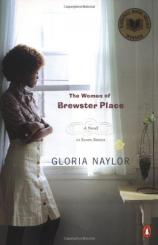Reading Group Guide
Discussion Questions
The Women of Brewster Place

The Men of Brewster Place
1. How would you describe Ben's role in this novel? What insights does he bring to each man's story? Why do you think Naylor resurrected his character?
2. What does Ben mean when he says, "We all live inside?" How is he, among the rest of the men featured in the novel, singularly able to make that statement?
3. Like Ben, Brother Jerome serves a universal function in the novel; although we don't discover much about his character, how does his story pave the way for the rest of the stories in the novel? What do his genius and his mental deficiency represent?
4. On the whole, do you feel sympathetically toward the men in this novel and their particular plights? To what extent are they responsible for their misfortunes, and to what extent are they the victims of social bias?
5. Two of the novel's most disparate characters are Moreland T. Woods and C. C. Baker, yet each man is responsible for hurting many people. How do they represent both ends of the spectrum of the black male experience? How do their respective dreams of greatness get in the way of becoming truly great?
6. The climax of the novel takes place in Max's barber shop, a place where "the men who sit . . . done solved every problem in the world before the shop closes each day." Why do you think Naylor chose it as the setting for Greasy's violent death? What importance does his death carry in relation to the lives of the other characters?
7. Ben claims that, "although a man grieves different from a woman, a whole lot more is kept inside to bite him a little here, a little there, until the blood begins to flow." How do the men of Brewster Place manage their grief? Is there a "better" way to grieve?
The Women of Brewster Place
8. What do you think of the novel's structure? How does each woman's individual voice reinforce the novel's themes as a whole? Does this group of women represent a cross section of women in general?
9. In what sorts of ways do each of these women find comfort in the hardships of their everyday lives? How does this reflect the strengths and weaknesses of each woman?
10. Each of these women cope with enormous loss in their lives, but each manages their grief differently. Compare, for instance, Mattie's loss of her house and her son with Ceil's loss of her baby. What could these women learn from each other?
11. How does Naylor portray the South, where many of these women came from, as both a land of plenty and a land of harsh deprivation? How are these women's lives different living in the North--are they happier? more fulfilled? more subject to racial bias? Is there more opportunity for them in Brewster Place than in the South?
12. What do you think of the way Lorraine and Theresa are treated by the other women in Brewster Place? What is Naylor saying about prejudice? Why do you think she concluded the novel with their story?
13. Each of these women is capable of enormous love, but they are often hurt by their loved ones. What do you think Naylor is saying about a woman's capacity for love? Is this sort of love "worth it"? Would these women be happier if they had hardened their hearts to those who eventually let them down?
14. What do you think the "death" of Brewster Place means for the future of its residents? How does Brewster Place continue to live on, once it is vacant? What do you make of Mattie Michael's dream, in which the women of Brewster Place dismantle the structure, brick by brick?
Pertaining to both novels:
15. Compare the endings of both novels. Does one ending feel more hopeful than the other? Considering that both novels end at the same time historically, yet were written fifteen years apart, how do you think the events of the last fifteen years affected Naylor's perspective on her characters' futures? Do you perceive a change in outlook in her writing?
16. Which of the male characters' stories surprised you, and why? Has knowing their "sides" of their stories changed the way you feel about them?
17. The epilogues of each novel, both quoting Langston Hughes, refer to "a dream deferred." What does this phrase signify in the lives of Brewster Place's men and women individually? How, in general, do the experiences of the women differ from that of the men? How are they similar?
The Women of Brewster Place
- Publication Date: June 30, 1983
- Paperback: 192 pages
- Publisher: Penguin (Non-Classics)
- ISBN-10: 014006690X
- ISBN-13: 9780140066906






